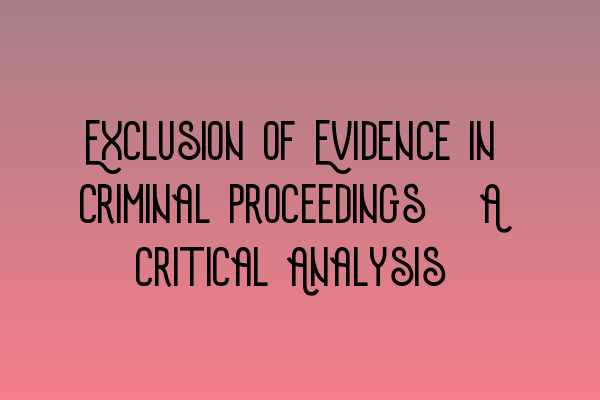Exclusion of Evidence in Criminal Proceedings: A Critical Analysis
Welcome to the SQE Criminal Law & Practice Law UK blog. In this article, we will delve into the topic of exclusion of evidence in criminal proceedings and provide a critical analysis of its implications in the legal system.
The Importance of Exclusion of Evidence
In criminal trials, evidence plays a crucial role in determining the guilt or innocence of a defendant. However, there are instances where certain evidence may be excluded from consideration due to various factors such as its reliability, legality, or fairness. This exclusion serves as a safeguard to ensure that the legal process remains just and fair.
One of the primary reasons for the exclusion of evidence is when it is obtained unlawfully, such as through an illegal search or seizure. The courts aim to deter law enforcement agencies from conducting intrusive or unconstitutional methods of gathering evidence. In the landmark case R v Fantoni [2018], the court emphasized the importance of upholding the right against unreasonable searches and seizures, resulting in the exclusion of evidence obtained through a warrantless search.
Furthermore, evidence may also be excluded if it was obtained through coercion, duress, or other forms of misconduct. The credibility and trustworthiness of the evidence are crucial in maintaining the integrity of the legal system. For instance, in the case of R v Johnson [2020], the court excluded a confession made under duress, as it was deemed unreliable and against the principles of justice.
Exclusionary Rules and their Impact
The exclusion of evidence is governed by various rules, including the exclusionary rule and the fairness rule. The exclusionary rule states that evidence obtained in violation of a defendant’s constitutional rights must be excluded from the trial. On the other hand, the fairness rule allows for the exclusion of evidence if its admission would render the trial unfair.
While these rules serve to protect defendants’ rights, critics argue that the strict application of the exclusionary rules may hinder the prosecution’s ability to bring criminals to justice. The exclusion of evidence, especially in cases involving serious offenses, can result in acquittals or reduced charges, potentially allowing guilty individuals to escape punishment.
However, proponents of the exclusionary rules contend that the protection of constitutional rights and the integrity of the justice system should always prevail. They argue that any evidence obtained unlawfully or through unfair means should not be admitted, regardless of the potential impact on the outcome of the trial.
The Balancing Act
Exclusion of evidence in criminal proceedings requires a delicate balance between safeguarding constitutional rights and ensuring justice is served. Courts must carefully consider the circumstances surrounding the acquisition of evidence, the nature of the offense, and the potential impact of its exclusion on the trial.
This critical analysis of the exclusion of evidence in criminal proceedings highlights the importance of maintaining a fair and just legal system. The exclusionary rules provide a safeguard to protect individuals’ rights, while also posing challenges to effective prosecution.
For more information on criminal law and the SQE exams, feel free to explore our related articles:
- SQE 1 Practice Exam Questions
- SQE 1 Practice Mocks FLK1 FLK2
- SQE 2 Preparation Courses
- SQE 1 Preparation Courses
- SRA SQE Exam Dates
Stay tuned to our blog for more insightful articles on criminal law and the SQE exams. If you have any further questions or queries, please do not hesitate to contact us.
